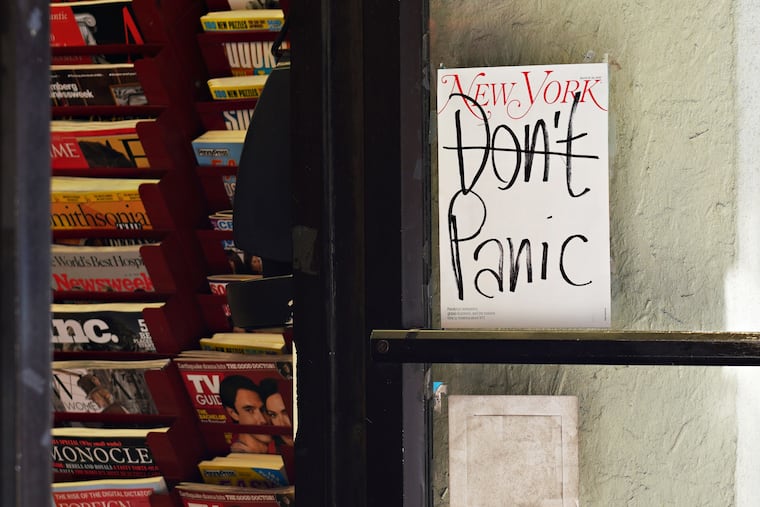Let’s all be deeply uncool and care for each other | Opinion
When 9/11 happened, I thought it was uncool to care too much. Now I know better.

I’ve thought a lot about my reaction to 9/11 in the last couple of weeks, as the world confronts another large-scale, unexpected, and deeply confusing crisis. When I first heard a plane had crashed, I waved off my coworkers’ panic and glossed over the details, assuming it was just an air traffic accident. Then I heard about the second crash. The Philadelphia City Paper put it best on its cover that week: “Nothing Will Ever Be the Same.” My colleagues’ distress had been entirely justified, while I was entirely an idiot.
This time, it’s not a single day of terror that obliterates buildings and lives. It’s a creeping, slow-motion disaster whose contours will not be fully understood for months, if not years. While it was easy for me to see how wrong I’d been to dismiss the first wave of 9/11 news, the minimizers in our midst today, grumbling over government-mandated shutdowns and precautions, seem unlikely to change their minds for a long time. If we’re lucky, they will have been right that the alarmed among us blew coronavirus out of proportion. But I don’t think so.
» READ MORE: SHARE YOUR STORY: How are you staying connected to your community amid the coronavirus outbreak?
Some people — like a Twitter follower of mine who has a Ph.D. in virology — claim an “anti-alarmist” stance because of a different understanding of the science. But others are dismissive of coronavirus panic for reasons tied instead to their personal psychology.
Take me in 2001, for instance. Though I didn’t say these words, my attitude was: People are stupid, they always freak out over some extraneous BS, I refuse to be bothered with it, they are just weak and lemming-like. I won’t join their vulnerable, weeping clutch – I’m better than that.
I have friends still poo-pooing the “hysteria,” the “hype." But I believe they’re actually really scared of being out of control.
My attitude was, at its root, a condescending defiance meant to separate myself from the masses: I had to be different, and to “know better.” I wanted to broadcast my superiority and remain above the fray, the one person who knew what everyone else didn’t. Of course, such a pose was driven by deep insecurity— and fear. Fear of the terror attack, sure, but also fear of being uncool, by overreacting.
Now, this same type of resistance to COVID-19 worries is all over the place. I have friends still pooh-poohing the “hysteria,” the “hype." But I believe they’re actually really scared of being out of control. I see people on Twitter talking about gullible idiots hiding in their homes, proud to say they’re still leaving the house for whatever reason they can. This reminds me of people who refuse to admit they like a Taylor Swift song. Some claim it’s very American to say, “You can’t tell me what to do,” but it’s also a reaction people have against uniformity, because deep down they’re afraid they’re actually average.
It’s a very particular psychology, with no political affinities, unlike some other resistance we see. My sister, for instance, an evangelical Christian in Colorado, believes the virus is a Democratic hoax forcing the government to impose laws she doesn’t want. For her, the anger at the hysteria is rooted in ideology. But for so many others, it’s just about being above it all.
That stance is not acceptable right now. Look at what’s happened in other countries: This is a genuine public health crisis.
If your own personal psychology inclines you toward resisting compliance, you need to do some soul-searching before you decide to gather in groups or get on the bus when you don’t need to. And if you have friends who are behaving this way, gently try to talk to them about where their feelings might be coming from.
Here are some general traits of the too-cool-for-school minimizer. See if they fit you or someone you love:
Believes that they know better than other people.
Prefers having control.
Frequently repelled, even disgusted, by group expressions of adoration, panic, or fear.
Put off by others’ strong shows of emotion but are somewhat emotional themselves.
Enjoys being the expert, knowing things other people don’t, possessing unique information.
Feels especially wounded when called out as wrong or incompetent.
As a recovering non-alarmist, I no longer pooh-pooh reactions the way I first did on 9/11. I don’t need to feel superior anymore, and I’m not afraid of looking stupid. (Here’s proof: I Shazamed a song the other day because it was catchy and it turned out to be Post Malone. I’m admitting that in a daily newspaper.)
Being cool or “above the fray” doesn’t matter, especially right now. You’re still going to be respected by people if you admit you’re scared. We all are. We are frightened, insecure, often incompetent human beings and we don’t have control over this thing. Let’s be deeply uncool — and care for each other.
Liz Spikol is a writer and editor in Philadelphia.